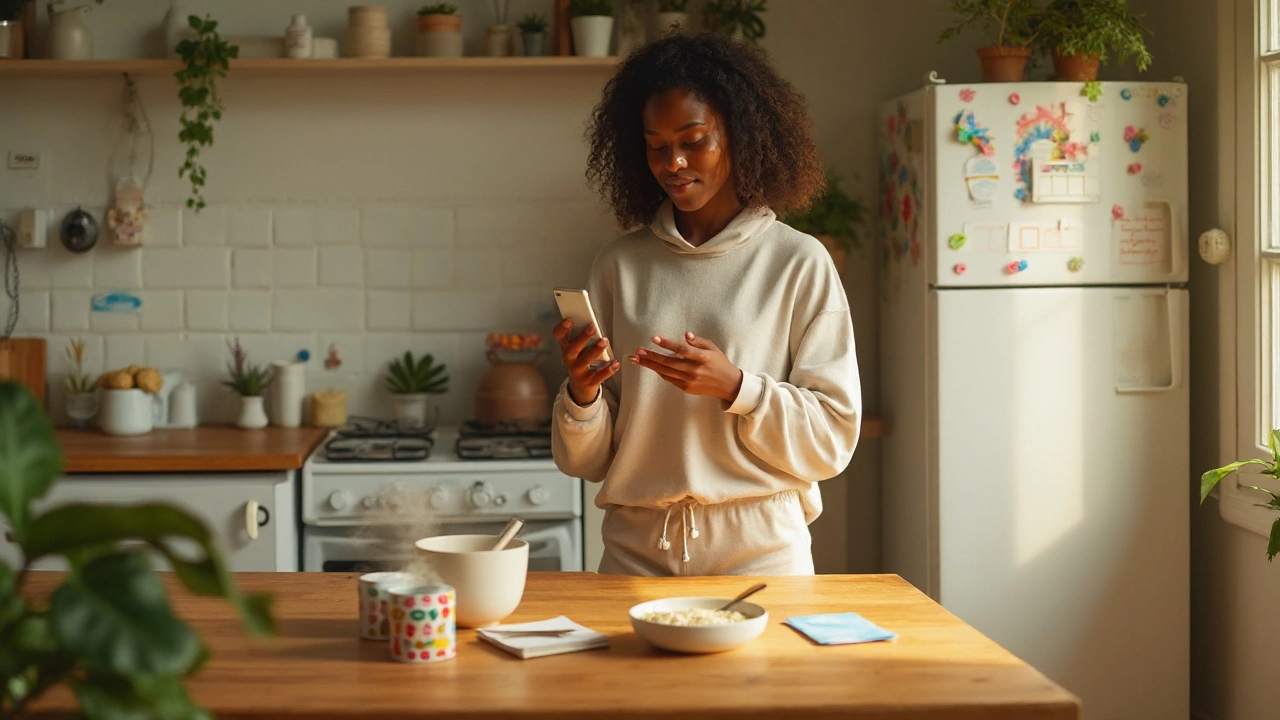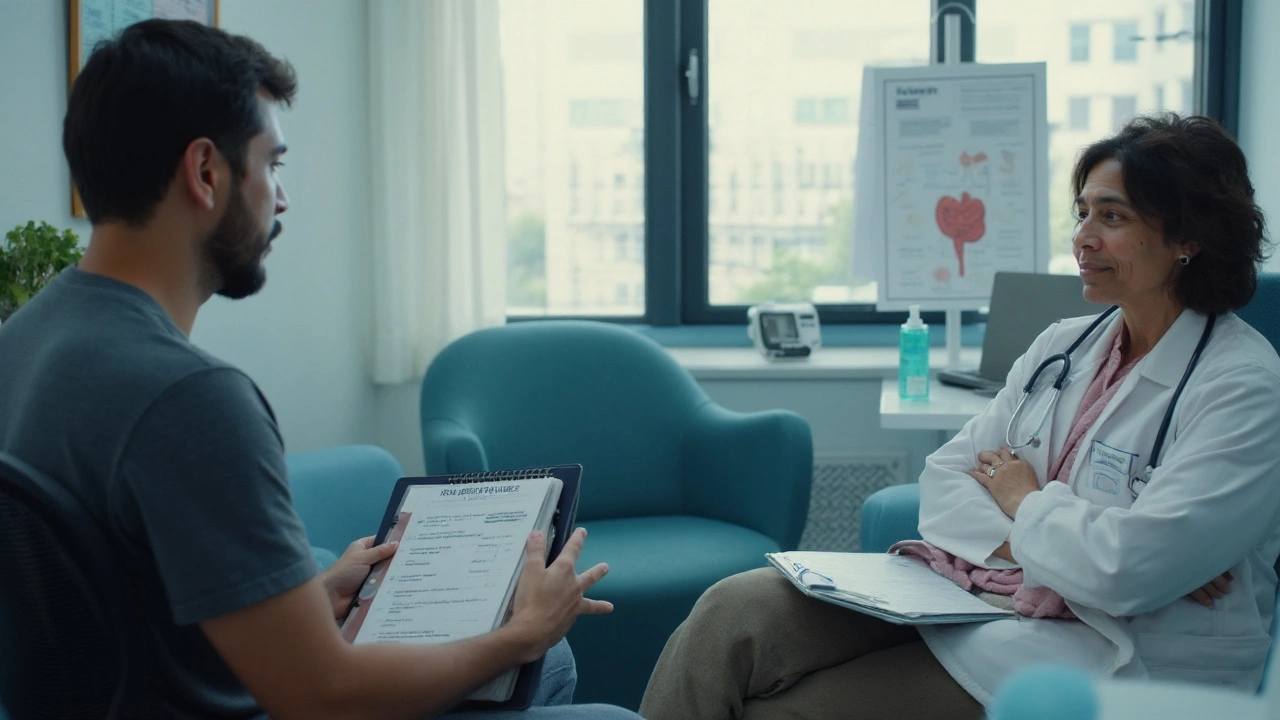
Your gut and your mind are in constant conversation. With ulcerative colitis, that conversation can get loud: fear of flares, bathroom math before every outing, the weight of plans you cancel. You want relief that goes beyond meds and scopes-ways to steady your head and protect your life from shrinking. This guide gives you practical tools you can use today, grounded in research and real-world experience. No magic. Just things that help.
TL;DR
- UC and mood feed each other; treating both yields better quality of life and often better disease control.
- Use short daily practices: paced breathing, urge surfing, movement, and a “flare script” to calm panic.
- Screen yourself with PHQ-2/PHQ-9 and GAD-7; share scores with your GI and primary care.
- CBT/ACT, antidepressants when needed, sleep and exercise, and peer support have good evidence in IBD.
- Build a plan for work/school, travel, and bad days; have a crisis safety plan and a go-bag.
What’s Going On: How UC and Emotions Feed Each Other
Here’s the tough truth: symptoms don’t just hurt-they change how you think. Pain and urgency prime your brain to scan for threats. Steroids can rev you up or drop you down. Social stress (Where’s the bathroom? Will I make it?) keeps your nervous system on high alert. That steady drip of stress can amplify flares and make everything feel bigger than it is.
None of this means you’re weak or dramatic. Anxiety and depression are common in inflammatory bowel disease (IBD). Large meta-analyses report anxiety in roughly one-third of people with IBD and depression in about a quarter, with higher rates during active disease. A 2016 systematic review in Clinical Gastroenterology and Hepatology found depression around 15% in remission and up to 30% during flares. The American Gastroenterological Association’s 2021 Clinical Practice Update advises routine screening for anxiety and depression in IBD care. Treating mood isn’t a side quest; it’s part of treating IBD.
The good news: your mind-body system is plastic. Small daily inputs-breath, movement, sleep, connection, clear plans-shift your stress response and help dampen symptom spirals. You can’t control every flare, but you can control the conditions that make your brain feel safer and more flexible.
The Daily Playbook: Tools for Flares and Quiet Days
Think in short reps, not grand resets. Aim for practices you can do in bathrooms, cars, exam rooms, and on couches. Here’s a practical set you can rotate:
- 1-minute reset (anywhere): Box breathing. Inhale 4, hold 4, exhale 4, hold 4. Do 4 rounds. This lowers sympathetic arousal and can reduce urge panic in the moment.
- Urge surfing during bathroom anxiety: When you feel the swell, name it (“This is a wave”), soften your belly, unclench your jaw, breathe slow for 90 seconds. Most urges crest and fall in under two minutes. Then reassess. If you need to go, go. If the urgency passed, continue.
- 3×3 grounding for public places: Notice 3 things you can see, 3 sounds you can hear, and 3 points of contact (feet, seat, hands). It interrupts doom spirals.
- Micro-movement (10 minutes): Walk, stretch hips/low back, or do gentle yoga flows. In IBD, low to moderate exercise improves fatigue and mood without provoking flares (supported by small trials and patient-reported outcomes). The CDC’s baseline is 150 minutes/week, but even 10 minutes helps on tough days.
- Sleep anchor: Same wake-up time every day. Protect 7-9 hours most nights. Treat sleep like medication-because it is. The American Academy of Sleep Medicine supports consistent schedules and screens-down 60 minutes before bed.
- Steroid sanity check: If you’re on prednisone, expect mood swings, agitation, and sleep changes. Tell close people “It’s the meds, not you.” Plan extra wind-down and earlier lights-out while tapering.
A 5-step flare-day script (copy/paste for your notes):
- Pause 60 seconds. Box breathe 4×4×4×4.
- Assess: blood? Fever? New severe pain? If yes, message your GI portal now. If no, continue.
- Protect the day: send a short update to work/school (script below), move meetings, prioritize basics.
- Comfort plan: bland foods you tolerate, hydration with electrolytes, heat pad, low-impact movement 10 minutes.
- Evening review: note symptoms, triggers, meds taken, stress level (0-10), tomorrow’s small win.
Work/school micro-scripts:
- Manager: “I’m having a medical flare today. I’ll work remotely and focus on X and Y. I’ll reschedule Z. I’ll update you by 3 p.m.”
- Professor: “I’m managing a documented health condition with unpredictable symptoms. Today I need flexibility on attendance. I will submit A by Friday and attend office hours to stay on track.”
Partner/roommate micro-script: “Today’s a high-urgency day. I’m wired and tired. What helps: quiet, heat pad, and knowing meals are covered. Could you handle dinner?”
Mood quick-check (daily): Ask yourself two PHQ-2 questions: “Little interest or pleasure in doing things?” “Feeling down, depressed, or hopeless?” If your answer is “more than half the days” for either, consider doing a full PHQ-9 and sharing it with your doctor. For anxiety, use GAD-2 first, then GAD-7 if positive.
Things to skip on bad days: doomscrolling, new diets, big life decisions, vigorous workouts you haven’t trained for, alcohol to sedate anxiety. All of these can spike symptoms or stress later.

People and Plans: Doctors, Loved Ones, Work, and School
Isolation makes tough days brutal. Your support system isn’t just emotional; it’s a treatment layer. Here’s how to build it without awkward oversharing.
With your GI team:
- Bring data: symptom diary, bathroom count, blood, urgency scale (0-10), PHQ-9/GAD-7 scores, sleep hours, meds/supplements, and any side effects (especially steroid mood changes).
- Ask targeted questions: “How do we decide if this is a flare or IBS overlap?” “What’s our threshold for prednisone vs. adjusting my biologic?” “Can we screen and treat depression/anxiety as part of my plan?”
- Agree on a flare pathway: who to message, what labs, when to escalate. Capture it in your phone notes.
With a therapist: Look for someone comfortable with health conditions. CBT (cognitive behavioral therapy) helps with thought traps and behavior changes. ACT (acceptance and commitment therapy) helps you live by your values even when symptoms show up. Both have positive data in IBD for mood and quality of life. If you’re waiting for a therapist, many health systems offer group CBT or digital CBT in the meantime.
With family and friends:
- Educate once, not constantly: “UC is an inflammatory disease of the colon. It flares and calms. Some days I’m fine; some days I need bathrooms and rest.”
- Make clear asks: “Texts are better than calls on flare days.” “Please don’t suggest diets unless I ask.” “Can you be my plus-one for procedures?”
- Set social defaults: pick cafes with single-stall bathrooms; meet near your place if mornings are harder; give yourself a pre-planned Irish exit.
Work and school protections (U.S.): Reasonable accommodations are common: flexible breaks, remote options, near-bathroom seating, excused absences during flares, deadline wiggle room. Ask HR or disability services about documenting a chronic condition and setting a simple accommodation plan. Most managers want clarity and predictability; scripts above help.
Dating and intimacy: You don’t owe anyone a health TED talk on date one. But if it’s going somewhere, share it simply: “I have an inflammatory bowel disease. It’s managed, but flares happen. I’ve learned how to handle it.” Be direct about bathroom breaks. For body image stuff (scars, weight changes, ostomy in some cases), name the worry out loud with a partner; it tends to shrink once spoken.
What Works (Evidence): Therapy, Meds, Lifestyle
This isn’t a guess list. It’s what has signal in IBD or closely related conditions, according to the American Gastroenterological Association (2021), Crohn’s & Colitis Foundation guidance, and peer-reviewed studies. Always coordinate with your care team, especially if you’re on immunosuppressants or steroids.
| Intervention | Evidence in IBD | Time to Benefit | Best For | Cautions |
|---|---|---|---|---|
| CBT (Cognitive Behavioral Therapy) | Improves anxiety/depression and quality of life; does not consistently change inflammation markers | 4-8 weeks | Worry spirals, avoidance, flare-triggered panic | Needs practice between sessions |
| ACT (Acceptance & Commitment Therapy) | Improves psychological flexibility and distress; aids coping with chronic symptoms | 4-8 weeks | Ruminators, values-driven but blocked by symptoms | Leans on mindfulness; can feel odd at first |
| Mindfulness/MBSR | Small trials show better stress and QoL; mixed on disease activity | 2-6 weeks to feel calmer | Stress reactivity, insomnia | Start short to avoid frustration |
| SSRIs/SNRIs (e.g., sertraline, escitalopram, venlafaxine) | Effective for anxiety/depression; some observational data suggest better adherence and QoL in IBD | 2-6 weeks | Moderate-severe symptoms or not improving with therapy alone | Drug interactions; GI side effects early on; discuss with GI/PCP |
| Exercise (low-moderate) | Improves fatigue, mood, and function; safe in remission and often during mild disease | Immediate to 2 weeks | Energy dips, stress relief | Avoid high-intensity during active flares |
| Sleep optimization | Short sleep links to worse flares and mood; improving sleep helps stress tolerance | 1-2 weeks | Insomnia, frequent night awakenings | Watch caffeine, late screens; treat apnea if suspected |
| Peer support (groups, online communities) | Reduces isolation, normalizes challenges; improves self-efficacy | Immediate | Newly diagnosed, big life changes | Filter advice; avoid diet wars |
Heuristics to decide what to try first:
- If symptoms are mild and mood is shaky: start with sleep and movement anchors + CBT/ACT skills.
- If mood scores are moderate-severe (PHQ-9 ≥10 or GAD-7 ≥10): add a medication conversation with your doctor.
- If you’re on steroids: prioritize sleep and schedule guardrails; ask about faster tapers if safe.
- If isolation is the main pain: join a moderated IBD group or local chapter meet-up; give it three tries before judging.
About diets and supplements: Diet can calm symptoms for some, but restriction often adds stress. If you experiment (e.g., low-residue during flares), do it with a dietitian. Be cautious with supplements that promise to “heal the gut” fast or that interact with meds (St. John’s wort and some SSRIs don’t mix). Keep the goal simple: nourishment you can stick with.
Sober curiosity: Alcohol can poke both your gut and your sleep. Many people find ditching it for 4 weeks reduces urgency and morning anxiety. Reintroduce slowly and observe.

FAQ + Next Steps: Quick Answers and Troubleshooting
Does stress cause flares? Stress doesn’t “cause” UC, but it can influence immune signaling and behaviors (sleep, diet, meds) that affect flares. Lowering stress won’t cure UC, but it makes your plan work better.
Will anxiety meds mess with my UC meds? Many SSRIs/SNRIs play fine with mesalamine and biologics. Always run your full list by your GI/primary care. Watch for early GI side effects that often settle in 1-2 weeks.
Is cannabis helpful? Some patients report less pain and better sleep. Evidence for inflammation control is weak. Risks include dependence, anxiety in some, and interaction with motivation and memory. If you try it, discuss with your doctor and start low.
How do I know if it’s IBS overlap? If scopes/labs look quiet but urgency, cramping, and bloating persist, ask about IBS overlap. Treatments include gut-directed CBT, low-FODMAP trials with a dietitian, and antispasmodics. Don’t self-restrict long-term without guidance.
What about work travel? Book aisle seats, identify bathrooms with maps, pack a small kit (wipes, spare underwear, baggies, extra meds, electrolyte packets), and plan extra buffer time. Practice your “late arrival” script in advance.
How do I tell friends without making it a big deal? Keep it short and direct: “I have UC. It flares at times. If I dip out or order bland food, that’s why.” Offer a way they can help: “Texts are great on tough days.”
Checklists you can use right away
- Doctor visit checklist: symptoms (past 2-4 weeks), PHQ-9/GAD-7 scores, sleep hours, diet notes, meds/supplements, side effects, 3 top questions, goal for visit (“decide on steroid taper,” “review lab plan”).
- Go-bag: wipes, underwear, pants, small trash bags, hand sanitizer, tissues, heat patch, pain-safe meds your GI approves, snacks/fuel you tolerate, water + electrolyte packet.
- Bad-day plan posted on fridge: who to message, safe foods list, chores your partner will cover, your grounding routine, and an early bedtime alarm.
Red flags: get medical help now
- Severe abdominal pain, high fever, persistent bloody diarrhea, dehydration, or signs of obstruction.
- New or worsening suicidal thoughts. If you feel unsafe, contact emergency services or the Suicide & Crisis Lifeline (US). Tell someone you trust right now.
What to do next (90-day game plan)
- Week 1-2: Start the daily playbook (1-minute breathing, sleep anchor, 10-minute movement). Track symptoms and mood. Schedule with your GI if you need a flare plan; request PHQ-9/GAD-7 screening.
- Week 3-4: Try one therapy skill set (CBT or ACT). If therapy access is slow, use a reputable workbook or a digital CBT program through your health system. Tell one trusted person your specific help list.
- Week 5-8: Review progress. If PHQ-9 or GAD-7 remain ≥10, talk with your doctor about adding medication. Dial in sleep (consistent wake time, wind-down ritual) and keep movement steady.
- Week 9-12: Reassess: What actually helped? Double down on that, drop what didn’t. Update your work/school accommodations if needed.
Troubleshooting
- “I do the breathing and still panic.” Keep the breath slow but not deep; emphasize the long exhale. Pair it with grounding (3×3). Panic peaking is normal-ride the wave, don’t fight it.
- “Exercise backfires.” Drop intensity and duration. Try 8-10 minutes after bathroom visits. Choose low-bounce options (walking, gentle bike, yoga).
- “Therapy feels too slow.” Ask for more behavioral homework and between-session goals. Consider group CBT for momentum.
- “I can’t sleep.” Move caffeine to morning, screens off one hour before bed, same wake time, cooler room. If steroids are the issue, ask about dose timing; sometimes morning dosing helps.
- “I’m sick of explaining UC.” Create a standard text you can forward: a two-paragraph plain-language summary about UC and what support helps you.
Why this matters
Addressing the emotional side doesn’t mean your disease is “in your head.” It means you’re treating the whole system-nervous, immune, social-so you can live a bigger life with fewer detours. That’s the point.
Sources for the claims here include the American Gastroenterological Association (Clinical Practice Update on Mental Health in IBD, 2021), Crohn’s & Colitis Foundation patient guidelines (updated through 2023), meta-analyses in journals like Inflammatory Bowel Diseases and Clinical Gastroenterology and Hepatology on anxiety/depression prevalence, CDC Physical Activity Guidelines for Americans, and the American Academy of Sleep Medicine recommendations. This is educational and not a substitute for medical care.
One last tip: name the condition out loud once a day-“I live with ulcerative colitis, and here’s what I can do today.” It keeps you in the driver’s seat.



man this is wild i had no idea stress could make my colitis worse like that
ive been doomscrolling for hours after every flare and now i get why its a spiral
gonna try the box breathing thing next time i feel the panic coming
this is the first time i’ve read something about UC that didn’t make me feel like a broken machine
you’re right-it’s not about fixing your gut, it’s about giving your whole system a chance to breathe
the 3×3 grounding trick? genius. i’m stealing that for my next grocery run
the flare script is literally life changing i printed it out and taped it to my bathroom mirror
pause 60 seconds box breathe assess protect comfort review
its so simple but i never thought to structure it like that
also sleep is medication wow
you call this practical? this is just wellness culture with a colonoscopy sticker on it
you think breathing helps? try eating real food and stopping the victim mentality
everyone’s got anxiety these days because they’re too lazy to just deal with it
you need discipline not a 10-minute walk and a mindfulness app
of course you’re telling people to use CBT and SSRIs… because Big Pharma loves to profit off gut trauma
did you know prednisone is a synthetic steroid that was originally developed to suppress immune responses in war victims?
now we’re drugging people into compliance with antidepressants while ignoring the real root cause: processed food and environmental toxins
and don’t even get me started on how the GI industry profits from endless scopes
why is everyone so obsessed with 'mental health' in IBD? this is a physical disease
you think meditation will fix a damaged colon? nah
we’re being gaslit into believing our bodies are just 'stressed' so we don't demand real cures
also who wrote this? a pharma rep? 🤔
Thank you, thank you, thank you-for writing this with such clarity, compassion, and precision! 🙏
As someone who’s lived with UC for 17 years, I’ve never seen a guide that so elegantly bridges the clinical and the human.
The ‘flare script’? I’m printing 10 copies. The ‘go-bag’ checklist? I’m updating mine tonight. The part about naming the condition out loud? I’m crying.
Someone finally said what I’ve been screaming into the void for years.
With gratitude, Sharon
I’m a GI nurse and I’ve seen patients burn out from trying to ‘fix’ themselves with diets and apps while ignoring the emotional toll.
This guide doesn’t just validate-it equips.
Especially loved the emphasis on sleep as medicine and the distinction between IBS overlap and true flares.
Thank you for making this accessible without dumbing it down.
Also, the steroid sanity check? Needed that.
One thing I’d add: don’t underestimate the power of a warm bath after a bad day. It’s not in the studies, but it’s in the lived experience.
just wanted to say i read this while on my way to the bathroom and i actually felt a little lighter 😌
the part about telling your partner 'quiet heat pad meals covered' made me tear up
thank you for writing this like someone who knows
also i made a go-bag last week and it feels like a superpower now 🎒💛
While your approach is superficially compelling, it lacks a deeper ontological grounding in the phenomenology of chronic illness.
One cannot reduce the lived experience of ulcerative colitis to a behavioral checklist without first interrogating the neoliberal medical apparatus that commodifies suffering into self-help products.
Is it not ironic that we are told to 'surf the urge' while the pharmaceutical-industrial complex profits from our compliance?
Furthermore, the recommendation of SSRIs without critical examination of their epistemic violence against bodily autonomy is ethically suspect.
True liberation lies not in breathing techniques, but in dismantling the very systems that pathologize difference.
Have you considered the colonial origins of CBT? Or the capitalist imperative to 'optimize' the sick body?
This is not healing-it is assimilation dressed in mindfulness.
why are people making this so complicated? just don’t eat dairy and you’ll be fine.
everyone’s just looking for excuses.
my cousin had it and he just stopped drinking milk and now he’s fine.
no therapy needed.
stop being weak.
so let me get this straight… you’re telling me to use a ‘flare script’ and ‘grounding’… but the same doctors who told me to take steroids are now telling me to breathe?
what if this is all a distraction?
what if the real cause is glyphosate in our food and they don’t want us to know?
why is no one talking about the 2018 EPA memo on IBD clusters near industrial farms?
you’re giving people bandaids while the real poison is still in the water.
and don’t even get me started on the CDC’s funding ties to Big Pharma.
you’re not helping-you’re gaslighting.
I appreciate the effort, but this reads like a corporate wellness pamphlet written by someone who’s never actually had a flare.
You mention ‘micro-movement’-have you ever tried walking 10 minutes when your gut is on fire?
You suggest ‘sleep anchor’-what if you’re up all night because your colon is screaming?
And ‘partner scripts’? You think my roommate is going to care about my ‘high-urgency day’? They don’t even know what UC stands for.
This guide is charming, but it’s not real life.
It’s therapy for people who have never missed a funeral because they couldn’t leave the bathroom.
It’s nice, but it’s not enough.
THIS IS A COVER-UP. 🚨
They want you to think breathing and sleep fixes it… but what if it’s the vaccines? Or the fluoride? Or the 5G towers near the GI clinics? 🤔
Why do all the ‘evidence’ studies come from institutions that take pharma money?
And why is no one talking about the 2022 leaked internal memo from Janssen about UC being a ‘biological response to mass psychological stress induced by digital overload’?
They’re hiding the truth so you’ll keep taking SSRIs and coming back for scopes.
Wake up. 🌍👁️
Also, I tried the box breathing. It made me feel worse. Coincidence? I think not.
to the person who said 'just stop eating dairy'-i’ve tried every diet under the sun.
low-FODMAP? keto? paleo? all made me worse.
the only thing that actually helped was realizing my brain was screaming at me every time i felt a cramp.
not because i’m weak.
because my body was trying to tell me something.
and that’s what this guide got right.
you don’t fix the gut by punishing it.
you fix it by listening.
thanks for saying that out loud.
to the person who said 'this isn't real life'-you’re right.
none of this is easy.
but I’ve seen patients who used the flare script and went from missing work every week to keeping their job.
who used the go-bag and finally took a road trip.
who said 'I live with ulcerative colitis' out loud for the first time and cried-but breathed.
it’s not magic.
it’s not a cure.
but it’s a way to stop the disease from stealing your life one panic attack at a time.
and that’s worth something.
to the person who said 'you don’t understand'-i get it.
i’ve missed my sister’s wedding.
i’ve cried in a gas station bathroom.
i’ve told my boss i had food poisoning.
but i also got to hold my nephew for the first time last week.
because i had a plan.
and a go-bag.
and someone who texted me 'you got this' when i was scared.
that’s real life too.
and it’s worth fighting for.
💛
the author is a saint
if you're reading this and you're having a bad day
you're not broken
you're surviving
and that's enough